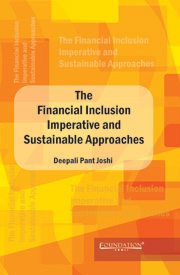Book contents
- Frontmatter
- Contents
- Foreword
- Acknowledgment
- 1 An Overview on Development
- 2 Financial Inclusion: The Nature and Extent of the Challenge
- 3 Financial Inclusion: The Indian Perspective
- 4 Tackling Financial Inclusion and RBI Policy: Responses and Voluntary Initiatives of Banks
- 5 Microfinance Experience and Other Institutional Approaches
- 6 Policy Response Committee on Financial Inclusion
- 7 International Experience in Promoting Financial Inclusion and Policy Responses
- 8 The Way Forward – Determinants and Macro Policies
- Appendix
- Bibliography
- Index
5 - Microfinance Experience and Other Institutional Approaches
Published online by Cambridge University Press: 05 June 2012
- Frontmatter
- Contents
- Foreword
- Acknowledgment
- 1 An Overview on Development
- 2 Financial Inclusion: The Nature and Extent of the Challenge
- 3 Financial Inclusion: The Indian Perspective
- 4 Tackling Financial Inclusion and RBI Policy: Responses and Voluntary Initiatives of Banks
- 5 Microfinance Experience and Other Institutional Approaches
- 6 Policy Response Committee on Financial Inclusion
- 7 International Experience in Promoting Financial Inclusion and Policy Responses
- 8 The Way Forward – Determinants and Macro Policies
- Appendix
- Bibliography
- Index
Summary
While the international studies on poverty have been rich and abundant, theoretical and empirical studies have been made on the subject of measuring poverty and targeting the poor for income transfer programmes. Several other strands that deal with specific sets of measures to either protect or promote the poor have also emerged. The growing interest in microfinance as a strategy for poverty alleviation is a case in point. There is a need to identify the key impediments in providing microfinance services to the poor and the necessity of a framework for scaling up the services rendered by various organisations to the poor and the unorganised sector. Introduction of the right incentives and removal of distortions would undoubtedly enable the sector to fulfil its developmental obligations, specifically the enhancement of accessibility of financial services to the poor. While the World Bank has estimated the annual demand for credit support from the 75 million poor households at Rs 450 billion, the extent to which this demand is satisfied by the formal banking sector and by the MFIS has not been ascertained. Several micro level studies however indicate that the poor still continue to depend on informal sources of credit and these sources account for 40 per cent to 60 per cent of household demand. The challenge for mainstream banking institutions and the microfinance sector is how to bridge the gap. The emergence of microfinance brings into sharper focus the need to provide appropriate delivery mechanisms for financial services and the poor are willing to pay for door delivery of reliable financial services.
- Type
- Chapter
- Information
- The Financial Inclusion Imperative and Sustainable Approaches , pp. 131 - 187Publisher: Foundation BooksPrint publication year: 2011



